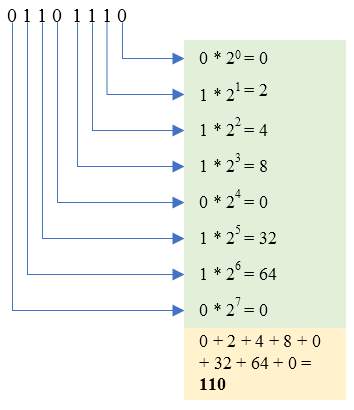Write a C program to input binary number from user and convert binary number to decimal number system. How to convert from binary number system to decimal number system in C programming. Logic to convert binary to decimal number system in C programming.
Example
Input
Input number: 0011
Output
Decimal: 3
Required knowledge
Basic C programming, If else, While loop, Functions
Binary number system
Binary number system is a base 2 number system. Binary number system uses only 2 symbols to represent all its numbers i.e. 0 and 1.
Logic to convert binary to decimal number system

Step by step descriptive logic to convert binary to decimal number system.
- Input binary number from user. Store it in a variable say binary.
- Find last digit from binary by performing modulo division. Which is
lastDigit = binary % 10. - If lastDigit is 1. Then add power of 2 to the decimal result. Which is
decimal += pow(2, N), where N is the position from right.
Program to convert binary to decimal number system
/**
* C program to convert binary number system to decimal number system
*/
#include <stdio.h>
#include <math.h>
#define BASE 2
int main()
{
long long binary, decimal=0, tempBinary;
int N=0;
printf("Enter any binary number: ");
scanf("%lld", &binary);
tempBinary = binary;
while(tempBinary!=0)
{
/* If current binary digit is 1 */
if(tempBinary % 10 == 1)
{
decimal += pow(BASE, N);
}
N++;
tempBinary /= 10;
}
printf("Binary number = %lld\n", binary);
printf("Decimal number= %lld", decimal);
return 0;
}In the above program I have used pow() function. pow() function is used to find power of a number.
Note: The above program will convert only up to 18 binary bits and will also not check for negative binary value. You can use below approach to check for negative value and also to convert binary number (greater than 18 bits) to decimal number.
/**
* C program to convert binary to decimal number system
*/
#include <stdio.h>
#include <math.h>
#include <string.h>
#define SIZE 16 /* N-bit binary number */
void getTwosComplement(char *twosComp, const char *);
int main()
{
char binary[SIZE + 1], tempBinary[SIZE + 1];
int i, j, signBit = 0;
long long decimal = 0;
printf("Enter any %d bit binary value: ", SIZE);
gets(binary);
strcpy(tempBinary, binary);
/*
* If sign bit is on find two's complement of the binary number
*/
if(binary[0] == '1')
{
signBit = 1;
getTwosComplement(tempBinary, binary);
}
/*
* Convert decimal to binary number
*/
for(i=0; i<SIZE; i++)
{
if(tempBinary[i] == '1')
{
decimal += pow(2, (SIZE - (i+1)));
}
}
if(signBit==1)
{
decimal *= -1;
}
printf("Binary value = %s\n", binary);
printf("Decimal value = %lld", decimal);
return 0;
}
/*
* Gets the 2's complement of the binary value.
*/
void getTwosComplement(char * twosComp, const char * binary)
{
char onesComp[SIZE + 1];
int i, carry=1;
/*
* Finds 1's complement of the binary number
*/
for(i=0; i<SIZE; i++)
{
if(binary[i]=='1')
{
onesComp[i] = '0';
}
else if(binary[i]=='0')
{
onesComp[i] = '1';
}
}
onesComp[SIZE] = '\0';
/*
* Adds 1 to 1's complement of the binary number to get 2's complement
*/
for(i=SIZE-1; i>=0; i--)
{
if(onesComp[i]=='1' && carry==1)
{
twosComp[i] = '0';
}
else if(onesComp[i]=='0' && carry==1)
{
twosComp[i] = '1';
carry = 0;
}
else
{
twosComp[i] = onesComp[i];
}
}
twosComp[SIZE] = '\0';
}Output
Enter any 16 bit binary value: 0100000010001100 Binary value = 0100000010001100 Decimal value = 16524
Happy coding 😉
